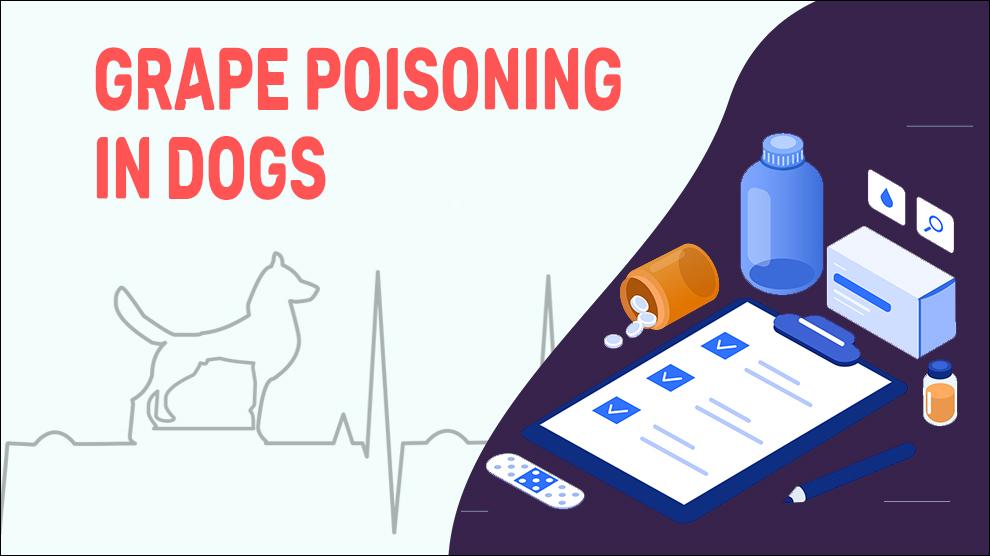What Is Grape Poisoning In Dogs?
Consumption of Grapes and grape-containing products can cause grape toxicosis in your dog. It doesn’t matter whether the grapes are fresh or dried- all forms of the grapes, including the juice form, are dangerous for your dog. Moreover, other forms of grapes— dried, jelly, and even currants are risky as well.
The reason Grapes and other Viti genus members are dangerous is because it doesn’t take a lot to cause health problems in dogs. The toxicology and exact mechanism of toxicity are poorly understood, while the principal damage happens in the proximal renal tubular epithelium. Typically within 72 hours of ingestion of grapes or raisins, affected dogs develop anuric or oliguri renal failure.
30 to 40 grams of grapes per kilogram body weight can cause toxicity in dogs whereas for raisins 10 to 30 grams.
The preliminary signs of grape toxicity are diarrhea and/or vomiting and this starts about 6-12 hours after consumption. This is followed by inadequate production of urine, general weakness, dehydration, fatigue, and thirst. Oliguric or anuric renal failure can develop in 1-3 days.
Symptoms Of Grape Poisoning In Dogs
- Diarrhea
- Vomiting
- Loss of appetite
- Signs of abdominal pain
- Lack of urine production (anuria)
- Grapes or raisins in vomit or stool
- Weakness/ Low energy
- Excessive thirst
- Tremors
Treatment Options For Grape Poisoning In Dogs
- If ingestion was in the past 1-2 hours or less, Vomiting may be stimulated or vets use saline solution to flush the stomach and remove any undigested toxic portions.
- 3% hydrogen peroxide (2 mL/kg), after activated charcoal, can be administered to decrease absorption of the toxins from the GI tract.
- IV fluids to maintain hydration and to flush the bloodstream.
- Severe cases may medications to stimulate urine production.
- Oliguric dogs : Furosemide (2 mg/kg, IV) and/or dopamine (1–3 mcg/kg per minute, IV).
- Anuric dogs: Peritoneal dialysis or hemodialysis.
Home Remedies For Grape Poisoning In Dogs
The home remedies for kidney damage in dogs start with providing their body with enough nutrients to facilitate the production of urine.
Ask your veterinarian for advice about a special diet for your dog.
How To Prevent Grape Poisoning In Dogs?
- Make aware of everyone in the household not to share their human food with pets especially if it contains grapes (ex. Grape juices, raisins, wine, etc).
- Keeping the grape, dried fruits, juices, and supplements away from your dog is the best prevention.
- Place the canine toxic substances in a cupboard at inaccessible locations for your pet.
- Dispose of leftovers and watch the things that get dropped on the floor since scraps or groceries can be easily picked up by your dog.
Affected Dog Breeds Of Grape Poisoning
- There is no breed disposition
- Bedlington Terrier, Doberman Pinscher and West Highland White Terrier are overrepresented
Causes And Diagnosis For Grape Poisoning In Dogs
1. Causes:
- Grapes
- Dried grapes
- Grape juice
- Currants
- Raisins
- Baked products containing grapes or currants
- Wine
- Trail-mix
2. Risk factors:
These Susceptible traits can make certain dogs more susceptible than others
- Dogs with kidney diseases
- Weak/debilitated/ old dogs
- Individual sensitivity
3. Morbidity:
If large amounts have been ingested, grape toxicosis may manifest within one day of consumption; however, most common clinical signs develop within 1-3 days.
4. Diagnosis:
- Physical examination
- Complete blood cell count (CBC), hemoglobin concentration
- Biochemistry analysis
- Blood glucose levels
- Urinalysis
- Abdominal radiograph (x-ray)
- Ultrasound
- CT scan
5. Mortality:
When a dog consumes grapes or grape products of more than half a percent of its body weight, it would be at the risk of poisoning and if left untreated, it would be fatal.
6. Prognosis:
Mild exposure to grape or grape products has a good prognosis and the dogs will recover soon. Increased consumption of grapes can be serious, particularly without appropriate treatment. When you suspect that your dog has eaten an excessive amount of grapes, rush to the vet immediately even if there are no instant signs.
When To See A Vet For Grape Poisoning In Dogs?
Contact your vet right away, if you notice any of the following:
- If you suspect that your dog has eaten excessive grapes
- Excessive vomiting and diarrhea
Food Suggestions For Grape Poisoning In Dogs
- Never give grapes to dogs
- Food—offered 24 hours after initiation of treatment
- Bland diet- White Rice, boiled lean meat such as chicken or turkey
- Veg and fruit smoothies
- Sardines, salmon, and cod
- Broccoli, kale and Brussels sprouts, Potatoes or Sweet Potatoes
- Bland, nonfatty foods such as toast
Conclusion
Low doses of grapes ingestion that are treated immediately have a good prognosis, but consumption of large amounts has a poor prognosis.
The size, breed, age, and overall health determine the grape's toxicosis levels. Large breed dogs that consume small amounts of grapes may evade grapes toxicosis better than smaller dogs. Whenever toxic exposure is suspected, immediate action is recommended. Early consultation and treatment can help prevent serious health effects.

















